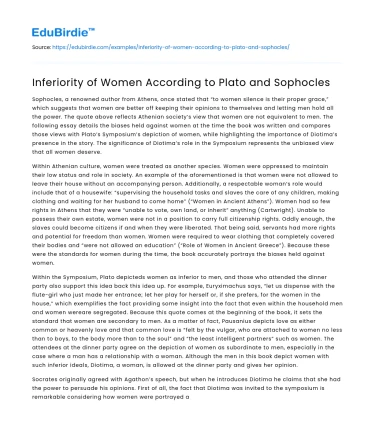Sophocles, a renowned author from Athens, once stated that “to women silence is their proper grace,” which suggests that women are better off keeping their opinions to themselves and letting men hold all the power. The quote above reflects Athenian society’s view that women are not equivalent to men. The following essay details the biases held against women at the time the book was written and compares those views with Plato’s Symposium’s depiction of women, while highlighting the importance of Diotima’s presence in the story. The significance of Diotima’s role in the Symposium represents the unbiased view that all women deserve.
Within Athenian culture, women were treated as another species. Women were oppressed to maintain their low status and role in society. An example of the aforementioned is that women were not allowed to leave their house without an accompanying person. Additionally, a respectable woman’s role would include that of a housewife: “supervising the household tasks and slaves the care of any children, making clothing and waiting for her husband to come home” (“Women in Ancient Athens”). Women had so few rights in Athens that they were “unable to vote, own land, or inherit” anything (Cartwright). Unable to possess their own estate, women were not in a position to carry full citizenship rights. Oddly enough, the slaves could become citizens if and when they were liberated. That being said, servants had more rights and potential for freedom than women. Women were required to wear clothing that completely covered their bodies and “were not allowed an education” (“Role of Women in Ancient Greece”). Because these were the standards for women during the time, the book accurately portrays the biases held against women.
Within the Symposium, Plato depicteds women as inferior to men, and those who attended the dinner party also support this idea back this idea up. For example, Euryximachus says, “let us dispense with the flute-girl who just made her entrance; let her play for herself or, if she prefers, for the women in the house,” which exemplifies the fact providing some insight into the fact that even within the household men and women wereare segregated. Because this quote comes at the beginning of the book, it sets the standard that women are secondary to men. As a matter of fact, Pausanius depicts love as either common or heavenly love and that common love is “felt by the vulgar, who are attached to women no less than to boys, to the body more than to the soul” and “the least intelligent partners” such as women. The attendees at the dinner party agree on the depiction of women as subordinate to men, especially in the case where a man has a relationship with a woman. Although the men in this book depict women with such inferior ideals, Diotima, a woman, is allowed at the dinner party and gives her opinion.
Socrates originally agreed with Agathon’s speech, but when he introduces Diotima he claims that she had the power to persuade his opinions. First of all, the fact that Diotima was invited to the symposium is remarkable considering how women were portrayed at the time. Not only that, but Socrates even said that Diotima is “a woman who [is] wise about many things” and that “she is the one who taught [him] the art of love,” implying that she had authority and wisdom–characteristics unknown to women at the time. Furthermore, the claims in her speech break boundaries other speeches had not even addressed, such as “reproduction and birth in beauty”. This phrase not only answers Phaedrus’ original question on what the purpose of love is, but is the only phrase in all the speeches that address it.
Through the biases held against women in Athens and the depiction of women in the Symposium, a clear path to understand Diotima’s significance is made.
The dominant culture of Athens held many biases against women, withholding them from living a civilized life. Within the Symposium, women were depicted as inferior to men due to the biases held against them. Diotima’s presence at the symposium is significant simply by just that. Her quick thinking and respect are substantial for the time the book was written, and quite possibly opens the doors to future pieces of literature.






 Stuck on your essay?
Stuck on your essay?

